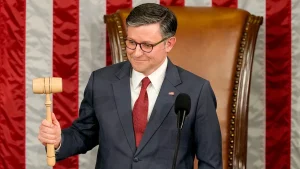Argentina’s $20 Billion Lifeline: Opportunity or Risk for Milei’s Economic Reformation?
In the heart of South America, a high-stakes economic drama is unfolding as Argentina’s newly elected president, Javier Milei, navigates the treacherous waters of economic reform bolstered by a potential $20 billion international loan package. This substantial financial injection, aimed at stabilizing the nation’s volatile economy, represents both a critical opportunity and a considerable gamble for the libertarian leader’s ambitious agenda. Financial analysts, political observers, and everyday Argentinians are watching closely as this economic lifeline takes shape, questioning whether it will finally break Argentina’s cycle of financial crises or simply add another chapter to the country’s troubled economic history. The implications extend far beyond Buenos Aires, potentially affecting regional stability and international financial markets, as creditors weigh the risks of supporting Milei’s unorthodox economic approach during a period of global economic uncertainty.
The Economic Tightrope: Milei’s Reformation Agenda Under the Spotlight
Since taking office in December 2023, President Milei has embarked on an aggressive economic reform program that has both shocked and intrigued international observers. His platform of “economic shock therapy” includes dramatic cuts to government spending, significant reductions in public sector employment, deregulation of key industries, and a controversial proposal to eventually replace the Argentine peso with the U.S. dollar. The administration has already slashed subsidies for utilities and transportation while implementing a substantial devaluation of the peso, moves that have sent immediate ripples through an economy already suffering from one of the world’s highest inflation rates—exceeding 200% annually. “This medicine is bitter but necessary,” Milei has repeatedly stated, defending policies that have initially deepened economic hardship for many Argentinians.
The proposed $20 billion loan package, primarily expected to come from international financial institutions like the International Monetary Fund (IMF) and possibly supplemented by bilateral agreements with key allies, would provide crucial breathing room for these reforms to take root. Economic Minister Luis Caputo has emphasized that the funds would primarily stabilize foreign reserves, service existing debt obligations, and support the transition to a more market-oriented economy. “We’re not seeking these funds to continue unsustainable spending practices,” Caputo explained during a recent press conference in Buenos Aires. “Rather, this package would provide the stability needed to implement structural reforms that previous administrations have avoided for decades.” However, economists remain divided on whether the loan amounts to prudent support for necessary reforms or simply adds to Argentina’s already substantial debt burden, which currently stands at approximately 90% of GDP following numerous previous bailouts and restructurings.
Historical Context: Argentina’s Troubled Relationship with International Creditors
Argentina’s complex history with international loans casts a long shadow over the current negotiations. The country has experienced no fewer than nine sovereign defaults since its independence in 1816, with the most recent major crisis occurring in 2001 when Argentina defaulted on approximately $100 billion in debt—the largest sovereign default in history at that time. That financial collapse triggered a profound social and political crisis, with unemployment reaching 25% and poverty rates exceeding 50%. The memory of that period—characterized by frozen bank accounts, social unrest, and a revolving door of five presidents in two weeks—remains vivid in the national consciousness and informs current skepticism about foreign loans.
The country’s more recent experience with the IMF has been equally contentious. A $57 billion loan package approved in 2018 under former President Mauricio Macri—the largest in the IMF’s history—failed to prevent economic deterioration and became a political liability for Macri, contributing to his electoral defeat. Subsequent negotiations under the Peronist administration of Alberto Fernández resulted in multiple restructurings but little economic improvement. “Argentina has developed an almost cyclical relationship with international creditors,” notes Dr. Maria Velez, an economist at the University of Buenos Aires. “We borrow in crisis, implement partial reforms, eventually abandon fiscal discipline, and then return to crisis, requiring new loans. The critical question is whether Milei can break this cycle.” This historical context makes the current loan package particularly sensitive, with critics arguing that international financial institutions have repeatedly enabled Argentina’s fiscal irresponsibility while supporters maintain that this time—under Milei’s leadership—the outcome could be different.
Political Challenges: Domestic Resistance and International Expectations
The domestic political landscape presents significant challenges for Milei’s administration as it pursues both economic reforms and international financial support. His party, La Libertad Avanza, holds a minority position in both houses of Congress, forcing the president to build coalitions with center-right and moderate lawmakers to advance his agenda. Recent protests against austerity measures have drawn tens of thousands to the streets of major cities, with labor unions and social organizations mobilizing against what they characterize as “reforms that punish the working class while favoring financial speculators.” Public opinion polls show a deeply divided population, with Milei maintaining approximately 45% approval ratings—strong by Argentine standards during economic adjustment but potentially insufficient to sustain political support through a prolonged period of economic hardship.
International creditors, meanwhile, have expressed both interest in supporting Argentina’s market-oriented reforms and concern about political sustainability. IMF Managing Director Kristalina Georgieva has publicly praised Milei’s “courage in addressing longstanding economic imbalances” while emphasizing that any new financial package would require “broad political support and social protection mechanisms.” Similarly, representatives from key potential bilateral lenders, including the United States and European nations, have indicated willingness to participate in a coordinated support package but expect Argentina to maintain democratic institutions and protect vulnerable populations throughout the adjustment process. The delicate balancing act between satisfying international creditors and maintaining domestic political viability represents perhaps the greatest challenge for Milei’s administration. “The technical aspects of economic reform are challenging,” observes political analyst Carlos Mendez of the Wilson Center’s Argentina Project, “but the political management of reform may ultimately determine success or failure. Milei must convince both international financiers and ordinary Argentinians that short-term pain will yield long-term gain—a difficult task given Argentina’s history of unfulfilled economic promises.”
Economic Risks: Potential Pitfalls of the Loan Package
Despite potential benefits, the proposed $20 billion loan package carries significant economic risks that could undermine its intended purpose. First and foremost is the danger of deepening Argentina’s debt burden without addressing underlying structural problems. The country’s debt service payments already consume approximately 15% of government revenues, limiting fiscal flexibility. Additional borrowing, even at preferential rates, could eventually prove unsustainable if economic growth fails to materialize. “The arithmetic is challenging,” explains Dr. Roberto Frenkel of the Center for Economic and Financial Research. “For this loan to be sustainable, Argentina needs to achieve primary fiscal surpluses and export growth rates that have rarely been maintained in recent decades.”
Another significant risk involves the loan’s potential impact on Argentina’s inflation dynamics. While the government has implemented strict monetary policies to control inflation, a substantial inflow of foreign currency could complicate these efforts if not properly sterilized. Additionally, the peso’s relative stability against the dollar in recent months—achieved through strict capital controls—could be jeopardized if market participants perceive the loan as merely postponing inevitable adjustments rather than supporting genuine reform. Most concerning to many economists is the possibility that external financing might reduce pressure for essential structural reforms addressing Argentina’s rigid labor markets, inefficient tax system, and excessive regulatory burden. “External financing can create a false sense of security,” warns former Central Bank economist Lucia Romero. “The risk is that difficult reforms get postponed once again because the immediate financial pressure has been relieved. Argentina has seen this movie before.”
The Path Forward: Balancing Opportunity and Responsibility
As negotiations for the loan package continue, both Argentina and its potential creditors face critical decisions that will shape not just the country’s economic future but potentially set precedents for international financial assistance in an era of growing global economic uncertainty. For President Milei, the challenge is to use any external support as a catalyst for sustainable economic transformation rather than merely as a short-term fix. This will require maintaining the political will to implement painful reforms while developing more effective safety nets for vulnerable populations affected by austerity measures. For international creditors, the challenge is to design a financial package with appropriate conditions that encourage genuine reform without imposing unrealistic targets that doom the program to failure.
The stakes extend beyond Argentina’s borders. A successful economic turnaround could provide a model for other developing economies struggling with high inflation and excessive debt, while another failed stabilization attempt could further erode confidence in international financial institutions and market-oriented reforms more broadly. “Argentina stands at a crossroads,” concludes economist Miguel Kiguel, who served in the Ministry of Economy during previous reform efforts. “The combination of a determined reformist president and substantial international support creates a genuine opportunity to break with decades of economic underperformance. But history teaches us to be cautious—Argentina has seen promising beginnings before, only to revert to unsustainable policies when reforms proved politically difficult.” As the Milei administration navigates these complex waters, the outcome will be determined not just by the size of financial support but by the wisdom, consistency, and political skill with which it is implemented.








